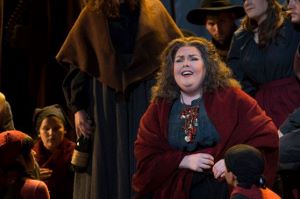
Singing Central to "Il Trovatore"
Tenor Enrico Caruso famously stated
that all it takes for a successful performance of Verdi’s “Il Trovatore” is “the four greatest singers in the world.”

It was in this spirit that Cincinnati Opera opened its 95th season Thursday night at Music Hall.
The four principal roles were beautifully sung by soprano Julianna Di Giacomo as Leonora, mezzo-soprano Jamie Barton as the gypsy Azucena, tenor Russell Thomas as Manrico and baritone Stephen Powell as Count di Luna, with bass Morris Robinson in the important subordinate role of Ferrando.
Robinson opened the show, delivering the backstory to the convoluted plot in the first scene of act one. And what a grisly story: In 15th century Spain, a gypsy woman, suspected of having bewitched Count di Luna brother, rending him sickly and frail, is burned at the stake. As she is dying she calls upon her daughter Azucena to avenge her, whereupon Azucena tosses what she believes is the Count di Luna’s baby son into the fire (as it turned out, it was her own son).
Years pass and the new Count di Luna finds himself in love with a lady in waiting at the court, Leonora. But Leonora’s heart has already been stolen by a mysterious troubadour (Manrico) who visits beneath her window at night. Di Luna determines to foil Manrico and the two fight an unresolved duel.
At the gypsy camp, scene of the famous “Anvil Chorus,” Azucena, who has raised Manrico, tells him the horrific tale of the baby’s death. Word comes that Leonora, believing Manrico to be dead, is about to enter a convent. Luna, still on her trail, arrives at the convent, vowing to make her his own. Manrico also arrives and reassures Leonora. Complicating the cumbersome plot, Manrico and di Luna are on different sides of a revolt. Outside di Luna’s camp, Ferrando captures Azucena and brings her to di Luna, believing her to be a spy. She is put in prison. When Manrico hears this, he rushes off to save her.
In the final scene, Manrico has been captured and imprisoned with Azucena. Leonora comes searching for him, but is carrying a drug with which to kill herself. Having encountered di Luna, she offers herself to him in exchange for Manrico’s life and he agrees (the poison is to foil di Luna).
Leonora, who has taken the poison, urges Manrico to flee but he refuses, suspecting some kind of deal has been made between her and di Luna. She tells him the truth and dies. The Count arrives and seeing what has happened, kills Manrico. Azucena tells him that he has killed his own brother.
Verdi has written fast-moving and captivating music to express all of this and, in fact, the three-hour opera went by very quickly, guest conductor Cristian Măcelaru leading the Cincinnati Symphony Orchestra in the pit.
Standout among the voices – all of
them well matched to their roles – was Barton as Azucena. She put distinct
color and texture into her phrases, expressing the gypsy’s troubled state with
keen expression. Thomas made an inspiring Manrico, his voice literally rising
to the occasion, including his showcase aria, “Di quella pira,” where he vows to save Azucena. Soprano Julianna Di Giacomo made a lustrous
Leonora and Powell’s smooth baritone lent special dignity to di Luna, while
bass Robinson as Ferrando was sheer luxury casting. The opera chorus, directed by Henri Venanzi, distinguished itself throughout, never moreso than in the "Anvil Chorus."
The production, by scenic
designer John Conklin, was minimal, comprising walls of wood facing each other on either
side, with a mountain and trees in the background. Lighting by Thomas Hase
reflected shades of blue from the predominantly blue backdrop.
The CSO (speaking of luxury casting) performed peerlessly in the pit, with conductor Măcelaru in the lead.
The opera repeats at 7:30 p.m. Saturday at Music Hall. Tickets, beginning at $25, available by calling (513) 241-2742, or visit www.cincinnatiopera.org